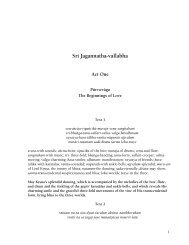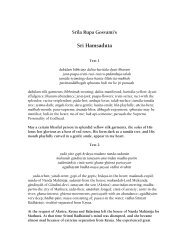Srimad Bhagavatam, Volume 3
Srimad Bhagavatam, Volume 3
Srimad Bhagavatam, Volume 3
Create successful ePaper yourself
Turn your PDF publications into a flip-book with our unique Google optimized e-Paper software.
<strong>Srimad</strong> Bhagawatam, First Canto, <strong>Volume</strong> Three<br />
Asate kusalam kachchit ye cha satrujid adayah<br />
Kacchit aste sukham ramah bhagawan satwatam prabhuh.<br />
Kacchit—whether, Raja—the king, Ahuka—Another name of Ugrasena,<br />
Jivati—still living, Asat—mischievous, Putra—son, Asya—his, Cha—also,<br />
Anujah—younger brother, Hridikah—of the name, Sasuta—along with sons<br />
such as, Akrura—of the name, Jayanta—of the name, Gada—of the name,<br />
Saranah—of the name, Asate—are they all, Kusalam—in happiness,<br />
Kacchit—whether, Ye—they, Cha—also, Satrajid—of the name, Adayah—<br />
headed by, Kacchit—whether, Aste—are they, Sukham—alright, Ramah—<br />
Valarama, Bhagwan—the Personality of Godhead, Satwatam—of the<br />
devotees, Prabhu—Protector.<br />
Whether Ugrasena whose mischievous son was Kansa is still living along<br />
with his younger brother Devak. Whether Hridik along with sons<br />
Kritavarma, Akrur, Jayanta, Gada, Saran and Satrajit all happy? How is<br />
Valarama the Personality of Godhead and the Protector of the devotees.<br />
Hastinapur the capital of the Pandavas was situated somwhere near present<br />
New Delhi and the kingdom of Ugrasena was situated in Mathura. While<br />
returning back from Dwarka, Arjuna must have had visited the city of<br />
Mathura on his way back to Delhi and therefore the enquiry about the king<br />
Mathura is valid. Amongst various names of the relatives the name of Rama<br />
or Valarama eldest brother of Lord Krishna, is added with the word<br />
Personality of Godhead because Lord Valarama is the immediate expansion of<br />
Vishnutatwa as Prakash Vigraha of Lord Krishna. The Supreme Lord<br />
although one without a second He expands Himself in many other living<br />
beings. The Vishnutatwa Living Beings are expansion of the Supreme Lord<br />
and all of them are qualitatively and quantitatively equal with the Lord. But<br />
expansion of the Javashakti the category of the ordinary living beings are not<br />
at all equal quantitatively save and except that the same living beings are only<br />
qualitatively equal with the Supreme Lord. One who considers Jivashakti and<br />
the Vishnutatta on the equal level are considered as the condemned soul of the<br />
world. Sri Rama or Valarama is the Protector of the devotees of the Lord.<br />
Valadeva acts as the Spiritual Master of all devotees and by His causeless<br />
mercy only the fallen souls are delivered. Sri Valadeva appeared as Sri<br />
Nityananda Prabhu during the advent of Lord Chaitanya and the Great Lord<br />
Nityananda Prabhu exhibited His causeless mercy by delivering a pair of<br />
extremely fallen souls namely the Jagai and Madhai. Therefore it is<br />
particularly mentioned herein that Valarama is the Protector of the devotees of<br />
the Lord. By His Divine Grace only one can approach the Supreme Lord Sri<br />
Krishna and as such Sri Valarama is the Mercy Incarnation of the Lord<br />
manifested as the Spiritual Master the savior of the pure devotees.<br />
Pradyumna sarva vrishninam sukham aste maharathah<br />
Gambhira raya aniruddha vardhate bhagavan uta.<br />
Pradyumna—son of Lord Krishna, Sarva—all, Vrishninam—of the members<br />
of Vrishni family, Sukham—happiness, Aste—are in, Maharathah—the great<br />
general, Gambhira—deeply, Raya—dexterity, Aniruddha—the name of<br />
another grand-son of Lord Krishna, Vardhate—flourishing, Bhagavan—the<br />
Personality of Godhead, Uta—must.<br />
How Pradyumna the great general of all the family members of Vrishni<br />
family is in happiness and how He Aniruddha the plenary expansion of<br />
the Personality of Godhead is faring well?<br />
Pradyumna and Aniruddha are also expansion of the Personality of Godhead<br />
and as such they are also Vishnutattwa. At Dwarka Lord Vasudeva is engaged<br />
in His transcendental pastimes along with His plenary expansions namely<br />
Sankarsan, Pradyumna and Aniruddha and as such each and every one of<br />
them can be addressed as the Personality of Godhead as it is mentioned in<br />
connection with the name of Aniruddha.<br />
Susena Charudeshnas cha sambo jambovatisutah<br />
Anye cha karshni pravarah saputra rishabhadayah.<br />
All chieftain-like sons of Lord Krishna such as Susena ,Charudhesna,<br />
Sambo the sons of Jambobati, Rishava and all others along with their<br />
sons etc. are they all dolng well?<br />
As already referred to herein before that Lord Krishna had married sixteen<br />
thousands one hundred and eight wives so each of them had ten sons.<br />
Therefore 16108X10=161080 sons. They were all grown up and therefore<br />
each of them had as many sons as their father and the whole aggregate was<br />
some thing near about one crores of family members of the Lord. It is just like<br />
the Lord. The Lord is the Father of all living beings who are countless by<br />
number and therefore if only a few of them is called for associating the Lord<br />
in his transcendental pastime as the Lord of Dwarka on this earth there is<br />
nothing to be astonished if the Lord maintained a visible family consisting of<br />
one crore of members. It is better to refrain ourselves from calculating the<br />
Lord's position as that of ours and it becomes a simple truth as soon as we<br />
understand at least a partial calculation of the Lord's transcendental position.<br />
King Yudhisthira while enquiring about the Lord's sons and grand sons at<br />
Dwarka, he mentioned only the chieftains amongst them otherwise it was<br />
18<br />
impossible for him also to remember all the names of the Lord's family<br />
members.<br />
Tatha eva anucharah soureh srutadeva uddhavadayah<br />
Sunanda nanda sirsanya ye cha anye satwata rishavah<br />
Api swasti asate sarve rama krishna bhujashryah<br />
Api smaranti asmakam kushalam baddhasouhridah.<br />
Tatha--similarly, Anucharah--constant companions, Soureh--of Lord Sri<br />
Krishna such as, Srutadeva--of the name, Uddhavadayah--Uddhava and<br />
others, Sunanda--of the name, Nanda--of the name, Sirsanya--other headmen,<br />
Ye--all of them, Anye--others, Satwata--liberated souls, Rishavah--the best<br />
men, Api--if, Swasti--well doing, Asate--are, Sarve--all of them, Rama--<br />
Valarama, Krishna--Lord Krishna, Bhujashryah--under the protection of, Api-<br />
-also if, Smaranti--do remember, Kushalam--welfare, Asmakam--about<br />
ourselves, Baddhasouhridah--bound up by eternal friendship.<br />
Similarly are they all such as Uddhava and others, Nanda, Sunanda and<br />
other head men leaders of the liberated souls who are constant<br />
companions of the Lord as also protected by Lord Valaram and Krishna<br />
doing well in their respective functions? Do they all who are all eternally<br />
bound up in friendship with us, do remember about our welfare?<br />
The constant companions of Lord Krishna such as Uddhava etc all are<br />
liberated souls and they had descended along with Lord Krishna on this<br />
material world to fulfill the mission of the Lord. The Pandavas are also<br />
similarly liberated souls who descended along with Lord Krishna to serve<br />
Him in His transcendental pastimes on this earth. As stated in the Bhagwat<br />
Geeta (Bg. 4.5) the Lord and His eternal associates who are also liberated<br />
souls like the Lord come down on this earth at certain intervals. The Lord<br />
remembers them all but His associates although liberated souls do forget<br />
about them on account of their being Tatastha Sakti or marginal potency of<br />
the Lord. That is the difference between the Vishnutatwa and Jivatatwas. The<br />
Jivatatwas are infinitesemal potential particles of the Lord and therefore they<br />
require the protection of the Lord at all times. And to the eternal servitors of<br />
the Lord the Lord is pleased to give all protection at all tlmes. The liberated<br />
souls never therefore think of themselves as free as the Lord or as powerful as<br />
the Lord but they always seek the protection of the Lord at all circumstances<br />
never mind either in the material world or in the spiritual world. This<br />
dependence of the liberted soul is constitutional as much as the sparks of the<br />
fire can exhibit the glow of fire along with the fire and not independantly.<br />
Independantly the glow of the sparks become extinguished although the<br />
quality of fire or glowing is there. As such those who give up the protection of<br />
the Lord and become so called lord themselves out of spiritual igonrance do<br />
come back again in this material world even after prolonged Tapasya of the<br />
severest type. That is the verdict of all vedic literature.<br />
Bhagwan api govinda brahmanya bhaktavatsalah<br />
Kachchit pure sudharmayam sukham aste suhridbritah.<br />
Bhagwan—the Personality of Godhead Krishna, Api—also, Govinda—One<br />
who enlivens the cows and the senses, Brahmanya—devoted to the devotees<br />
or the Brahmins, Bhaktavatsalah—affectionate for the devotees, Kachchit—<br />
whether, Pure—in the Dwarkapuri, Sudharmayam—pious assembly,<br />
Sukham—happiness, Aste—does enjoy, Suhridbritah—surrounded by friends.<br />
Whether Lord Krishna the Supreme Personality of Godhead Who is<br />
pleasure to the cows, senses and the Brahmins, Who is very much<br />
affectionate for the devotees, does enjoy in the pious assembly at<br />
Dwarkapuri surrounded by friends?<br />
Here in this particular verse the Lord is described as Bhagawan, Govinda,<br />
Brahmanya and Bhaktavatsal. He is Bhagwan Swayam or the original<br />
Supreme Personality of Godhead full with all opulences, all power, all<br />
knowledge, all beauty, all fame and all renunciatiens. No body is equal or<br />
greater than Him. He is Govinda because he is the pleasure of the cows and<br />
the senses. Those who have purified their senses in relation with devotional<br />
service of the Lord, can render unto Him real service and thereby derive<br />
transcendental pleasure out of such purified senses. On the impure codition<br />
the living being cannot derive any pleasure from the senses but being<br />
illusioned by false pleasure of the senses, becomes servant of the senses.<br />
Therefore we need His protection for our own interest. The Lord is the<br />
protector of the cow and the Brahminical culture. In a society which is devoid<br />
of cow protection and Brahminical culture, is not under the direct protection<br />
of the Lord as much as the prisoners in the jails are not under the protection of<br />
the king but under the protection of the severe agent of the king.<br />
Without cow protection and cultivation of the Brahminical qualities in the<br />
human society, at least for a section of members of the society, no human<br />
civilisation can prosper at any length. By Brahminical culture or developing<br />
the dormant quality of goodness namely truthfulness, equanimity, sensecontrol,<br />
forbearance, simplicity, knowledge general, knowledge<br />
transcendental and firm faith in the vedic wisdom, one can become Brahmin<br />
and thus one can see the Lord as He is. And after surpassing the Brahminical<br />
perfection one has to become a devotee of the Lord so that His living affection












